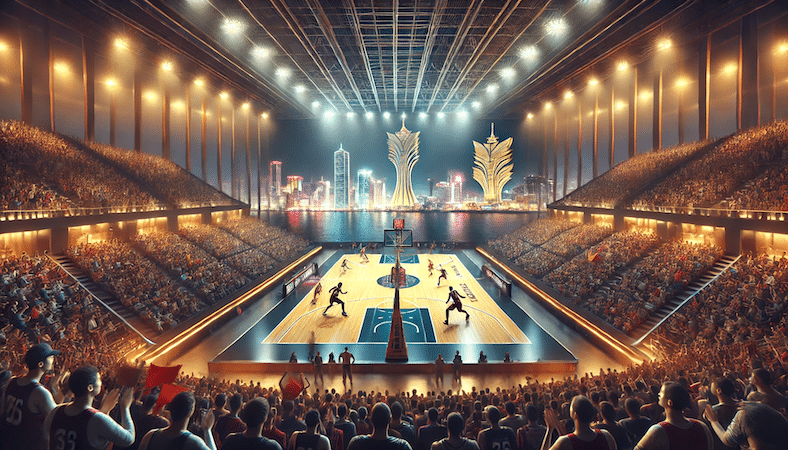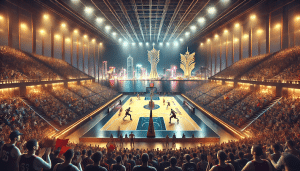The National Basketball Association (NBA) has secured a fresh agreement with Sands China, setting the stage for two pre-season games in Macau. This partnership highlights the NBA’s ongoing efforts to expand its international presence while aligning with Macau’s broader goal of economic diversification beyond its well-known casino industry.
Reviving Sports in Macau’s Leisure and Entertainment Scene
Scheduled for October 2025, the pre-season games will be held at the Venetian Arena in Macau. Fans will get the chance to watch the Brooklyn Nets and Phoenix Suns compete, marking a significant moment in Macau’s sports calendar.
This renewed collaboration deepens the connection between the NBA and Macau, which has hosted similar games in the past. However, this deal appears to elevate the partnership to a new level by fostering consistent sports entertainment supported by both the NBA and Macau’s administration.
Overcoming Past Challenges
Historically, NBA games were a regular feature in Macau until political tensions disrupted the partnership. The fallout stemmed from a controversial social media post by then-Houston Rockets General Manager Daryl Morey, who expressed support for Hong Kong protests against Beijing’s restrictive policies.
The incident led to suspended NBA broadcasts in China, causing a withdrawal of major investors and the cancellation of pre-season games in the region. This latest agreement signals a reconciliation and a shared interest in rekindling their past partnership for mutual benefit.
About Macau
Macau, a Special Administrative Region of China, has a rich history shaped by its strategic location along the Pearl River Delta. Established as a Portuguese trading post in the 16th century, it became a vital hub for commerce between Europe and Asia. This unique colonial legacy has endowed Macau with a distinctive cultural blend, evident in its architecture, cuisine, and bilingualism in Chinese and Portuguese. In 1999, sovereignty over Macau was transferred back to China, initiating a new era under the “one country, two systems” framework.
Macau’s economy heavily relies on its gaming industry, which accounts for over half of its GDP and provides employment to a large segment of its population. Home to six licensed casino operators, Macau features more than 40 casinos, including renowned venues like The Venetian Macao and Galaxy Macau. Its unique status as the only region in China where casino gambling is legally permitted draws millions of visitors, primarily from mainland China, fueling its tourism-driven economy.
In 2023, Macau experienced a strong rebound in gaming revenues following the challenges posed by the COVID-19 pandemic. November alone saw a Gross Gaming Revenue (GGR) of MOP$18.4 billion ($2.29 billion), reflecting a significant recovery. Industry experts anticipate continued revenue growth into 2024, supported by eased travel restrictions, a surge in mass-market visitors, and renewed interest from high-stakes VIP players. By late 2023, Macau’s GGR had already climbed to around 80% of its pre-pandemic levels.
Macau’s Push for Non-Gaming Opportunities
Historically, Macau’s economy has been dominated by the gaming and tourism sectors, with the casino industry contributing approximately 80% of local tax revenue. This reliance on gaming has made the economy susceptible to external factors, such as policy changes and global economic shifts. Recognizing these vulnerabilities, the Macau government has been actively pursuing economic diversification. Initiatives include promoting sectors like traditional Chinese medicine, health services, financial services, technology, conventions, exhibitions, trade, culture, and sports. The goal is for non-gaming industries to account for around 60% of Macau’s GDP by 2028, up from 50% in 2019.
Recent economic indicators reflect Macau’s efforts toward diversification and resilience. The International Monetary Fund projected that Macau’s economy would grow by nearly 14% in 2024, with a slight slowdown to a 9.6% growth rate in 2025. Inflation rates are expected to rise modestly, while unemployment is anticipated to decline, indicating a strengthening labor market.
These positive trends suggest that Macau’s strategies to broaden its economic base are beginning to yield results, positioning the region for sustainable growth in the coming years.
Expanding Macau’s Leisure and Tourism Industries
In 2023, officials announced ambitious plans to expand Macau’s leisure and tourism industries, with sports playing a central role in this strategy.
Basketball isn’t the only sport being promoted. In early November, Wynn Macau appointed snooker legend Ronnie O’Sullivan as its Official Brand Ambassador. Additionally, the resort has hosted high-profile snooker events to attract a broader audience, emphasizing non-gaming entertainment.
Further efforts to reshape Macau’s economy were reported in December, with the government appointing new officials tasked with reducing the region’s reliance on the gaming sector. This ongoing transformation highlights Macau’s commitment to building a more diversified and sustainable economy.
Related News
-
- Sports Betting in Massachusetts: Legalization Fails to Curb Illegal Betting
- Massachusetts Pushes for Transparency on Betting Limits and Kiosks
- Gaming Industry Boosts Spending on Responsible Gaming Efforts Amid Growing Commitment
- Best Crypto Sports Betting Sites in October 2024 – Compare Bitcoin Sportsbooks


